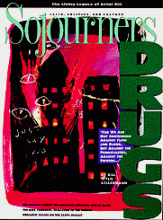For we are not contending against flesh and blood, but against the principalities, against the powers, against the world rulers of this present darkness. —Ephesians 6:12
William Stringfellow, the theologian who may be justly credited with reviving in this country a theology of the principalities and powers, claimed to be first put onto them by his friends and legal clients in Harlem who experienced, among other things, the mafia and its network of dealers as a predatory force invading their families and neighborhoods. His years of lucid reflection began in a certain sense with their intuitive theological street wisdom.
It is thereby all the more remarkable that in the churches' struggle against drugs there has been such meager theological reflection. Indeed the notorious frustration and substantial failure of the church in confronting the drug problem, so-called, may be partially rooted in this fundamental shortcoming: the failure to comprehend drugs biblically; that is, as numbered among the principalities and powers.
The officially sponsored "Just Say No" approach—and its churchly equivalents—effectively masks the character of the drug powers. While intimating resistance ("say no"), it first reduces the struggle to ("just") an individual exchange, an illegal street-level deal. The principality in its economic, political, cultural, and above all spiritual aspects remains hidden and is given a free hand to go about its deadly business.
Because the church's approach is firstly (and rightly) pastoral, the individualist temptation predominates. It is, however, especially pastoral care that requires the fullest comprehension of the powers.
A principality, whatever its particular form and variety, is a living reality, distinguishable from human and other organic life. —William Stringfellow, Free in Obedience
Read the Full Article
